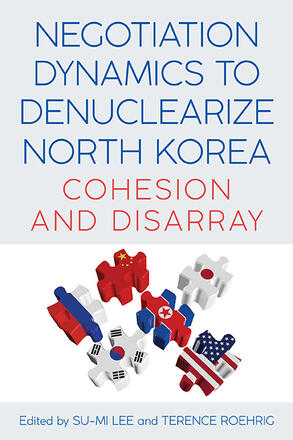
Negotiation Dynamics to Denuclearize North Korea
Cohesion and Disarray
Alternative formats available from:
Comprehensive examination of the goals, strategies, and motives of the six parties involved in North Korea denuclearization talks through the lens of negotiation theory.
Description
Was there ever a window of opportunity for successful negotiations over North Korea's nuclear weapons program? Negotiation Dynamics to Denuclearize North Korea brings together country experts with negotiation specialists to apply negotiation theory to the North Korea denuclearization process. Country expert chapters provide a detailed assessment of the goals, motives, and strategies of the six parties—North Korea, South Korea, the United States, China, Japan, and Russia—along with contextual variables of each player such as political, economic, and social conditions while the negotiation scholars collate and scrutinize the results of these key variables. Based on thorough descriptive contexts provided by the country experts, the negotiation scholars identify the lack of two factors, party cohesion and ripeness, as detriments to successful North Korea nuclear negotiations.
Su-Mi Lee is Associate Professor of Political Science at the University of Hawai'i Hilo. She is the author of Good Mediator: Relational Characteristics of Effective Mediators. Terence Roehrig is Professor of National Security Affairs at the United States Naval War College. His books include Japan, South Korea, and the United States Nuclear Umbrella: Deterrence After the Cold War and The Evolution of the South Korea-United States Alliance (coauthored with Uk Heo).
Reviews
"This volume is very helpful in considering how to bring North Korea back to the negotiation table, and what stances the major negotiating parties should maintain in denuclearization negotiations with North Korea." — Pacific Affairs
"Negotiation Dynamics to Denuclearize North Korea is an excellent addition to the fields of security studies, East Asian IR, Nuclear Non-Proliferation, and North Korean Politics and Foreign Policy. The volume offers a nice combination of theoretical framework and rich and multi-faceted empirical accounts of the international negotiations for denuclearization of North Korea. This is a rare scholarly work that carries out theory-guided analysis about North Korean foreign policy strategy in general and the weapons of mass destruction (WMD) programs in particular. As such, the book is theoretically rigorous, empirically rich, and highly policy-relevant." — Jongseok Woo, coauthor of Politics in North and South Korea: Political Development, Economy, and Foreign Relations